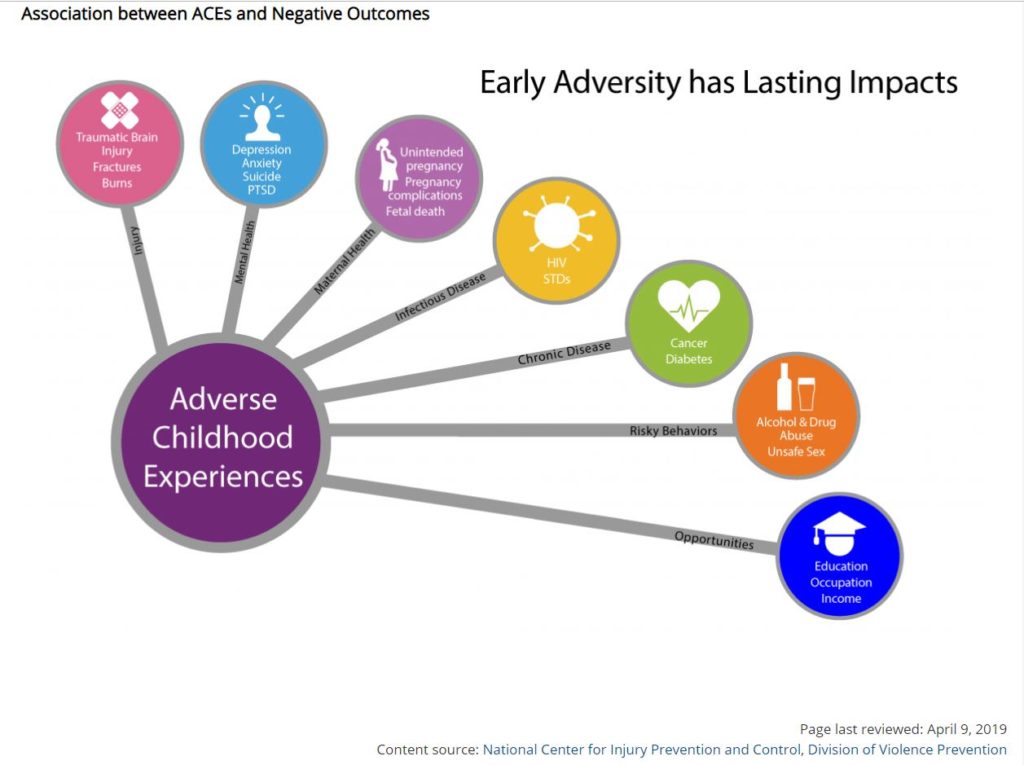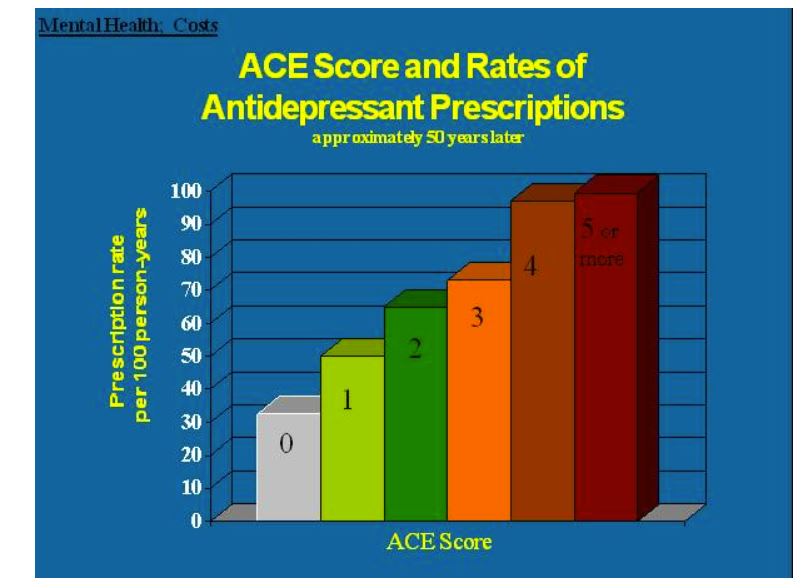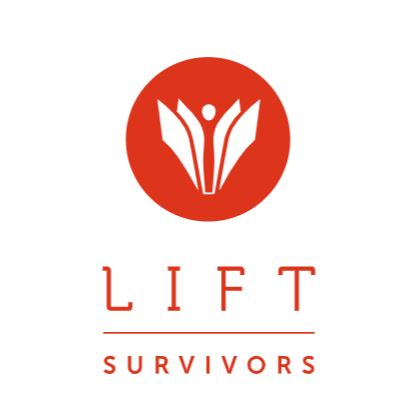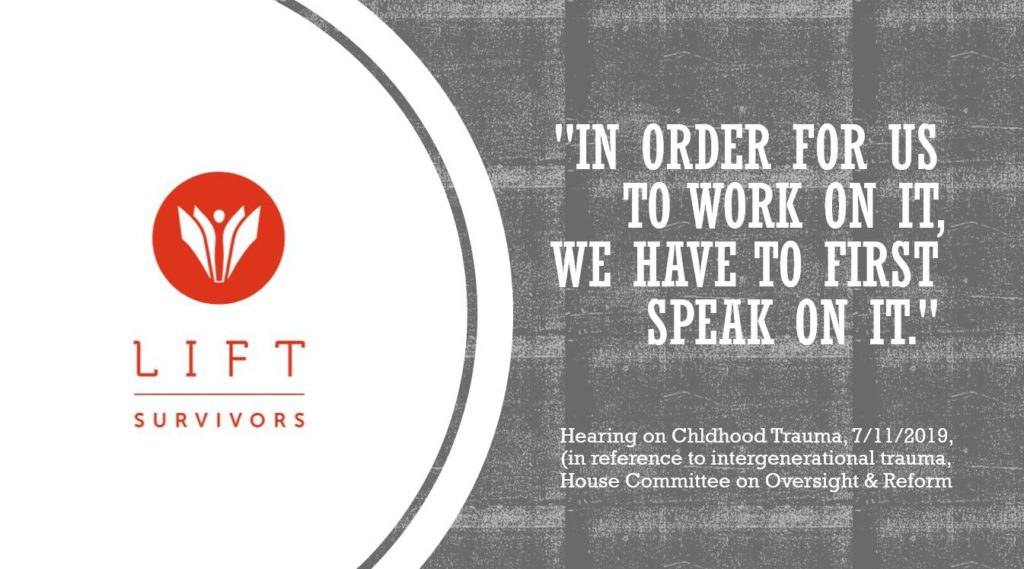I was debriefing with my friend (Robin Cogan, aka the relentless school nurse) about the first-ever hearing on childhood trauma last week by the Committee on Oversight and Reform (viewable here). Robin mentioned how powerful the survivor testimony was, written about here by Elizabeth Prewitt, and I wanted to celebrate and cheer.
But I kept biting my lip and swallowing my words. Some things were gnawing at me, and I wasn’t sure if I should just keep them to myself.
Robin and I are friends. We brainstorm, bond, and bare our souls to one another. So, I spilled about what I wished, noticed, or questioned as I watched the hearing without censoring myself.
• Why was “survivor panel” was 50 minutes long while the “expert panel” was 150 minutes long?
• Why was a distinction made at all between survivors and experts?
• How come survivors are called brave to speak up childhood trauma, on the one hand, and that shame of trauma isn’t ours at all on the other? If there’s no shame in being in post-traumatic pain, why is it so brave to talk or share?
• Is a standing ovation to the survivor panel sincere and appropriate or is real respect equal time rather than applause?
But even as I type these words, I’m hesitant.
I worry about sounding critical, negative, and angry.
After all, survivors were present, speaking in the first person, sharing personal experiences of childhood trauma. Historically, survivors are spoken for or about by “experts” as we’ve been deemed too fragile, vulnerable, or in need of anonymity or protection (even when we’ve not asked for it).
Rarely, have we been as visible, vocal, or as valued as during last week’s hearing. And that is crucial.
It wasn’t even the only radical and notable shift. This hearing did not rely on the traditional medical, and clinical model with the identify, diagnose, refer out, and treat individuals with trauma symptoms. It didn’t detail the symptoms of post-traumatic stress as though that’s the important conversation, and one that ignores that we only have a diagnostic code for those who get post-traumatic stress and nothing for who or what causes it.
This hearing was grounded, at least often, in considering root causes, and how the various types of adverse childhood experiences (ACEs), cause toxic stress, especially when chronic, cumulative, and without buffering threatening the growing brains, bodies, and belief systems of all humans.
That’s epic.
ACEs was said far more than PTSD or any other diagnosis.
The ACEs that happen in the home before the age of 19, are typically defined as follows:
- physical abuse
- sexual abuse
- emotional abuse
- physical neglect
- emotional neglect
living in a household before the age of 19 with a household member: - diagnosed as mentally ill
- with a substance abuse disorder
- who has been incarcerated
as well as parents who: - are divorced/separated or abandoned family
- have physically abused their partner (domestic violence)
Several of the expanded ACEs, which happen outside the home, during childhood were also mentioned: - homelessness
- violence in the wider community (bullying, gun violence)
- being in the foster care system
- racism, sexism, and other forms of discrimination

The move away from the shame-blame-treatment framing of childhood trauma, which has harmed survivors for far too long, is seismic. It’s evidence, in fact, of the power of the trauma-informed movement’s influence – even if it came without acknowledgement or apology for horrible treatment, historically.
That’s worth celebrating.
Not that it was perfect. Missing from the hearing though is the emphasis on who is most impacted, most often, by the most types of ACEs, though Dr. Houry did mention the research, from over 200,000 is titled, “Prevalence of Adverse Childhood Experiences From the 2011-2014 Behavioral Risk Factor Surveillance System in 23 States,” (link here) “significantly higher exposure reported by participants who identified as:
- black
- hispanic
- multiracial
- unemployed
- with less than a high school education
- with income of less than $15,000 annually
- gay
- lesbian
- bisexual
But I’m not sure those watching the hearing would know, that all of the above groups are more impacted more often by ACEs, “when compared with those identifying as white, those completing high school or more education, those in all other income brackets, those who were employed, and those identifying as straight, respectively.”
We know from ACEs research that women are more represented than men among those with higher ACE scores. This data is important because even though “childhood adversity is common across sociodemographic characteristics, but some individuals are at higher risk of experiencing ACEs than others.”
Not only was the dose of the dose of ACEs minimized during this hearing, but the general understanding about the dose-response curve central in all ACEs research. While it’s true that 2 out of 3 children do experience at least one type of traumatic stress, the number who experience 4 or more is far less, (approx. 15% with rates are higher among females than males when ACEs are > 4).
While NO ONE wants to be in the business of comparing trauma and pain, at the individual level, data is important when understanding population health. To imply that experiencing one type of adversity is similar to experiencing 5, 10, or all 14 is misleading and inaccurate and the ACEs research itself shows that those experiences come with significantly different health risks. See slides from ACEs Too High (below) from original ACEs study.



Don’t get me wrong. 1 ACE is worse than none and does come with health risks and that is true if the ACE is from abuse or neglect or a parent’s divorce, and important information. No one writes more or better than Donna Jackson Nakazawa about the impact of ACEs and how 2 ACEs increase the risks for auto-immune disorders, and as the numbers increase so do the risks.
However, one point is clear in the ACEs research and it is this. When it comes to adversity, more is worse. The cumulative impact of ACEs experienced in childhood extend risks across the lifespan. I’m just not sure that was clear in the hearing.
Still, it was a historic hearing being the first-ever, (which means only to date, on childhood trauma held by the House Committee on Oversight and Reform (still available on YouTube).
Robin talked about how compelling and emotional the survivor panel was and that she tuned in to watch the testimony and even shared some with her nursing students. I also binge-watched the entire hearing, twice, even though it was close to four hours long.
The second viewing made me even more uneasy than the first.
Robin asked me why.
“When survivors are brought in to provide graphic content to elicit an emotional response it’s sometimes called survivor porn,” I said, a term I’ve heard more often of late (such as here). It seemed to me that some of that happened at the hearing.
Rep. Ayanna Presley said, “all of this work to be survivor-led,” and I agree. But defining survivor leadership and differentiating it from survivor porn isn’t always easy.
Survivor porn is when survivors are brought in to deliver a specific narrative focused mainly around detailing or recounting childhood trauma, before survivors are excused so the “real work” of the conference, classroom, or committee, etc. can occur.
When it’s survivor-porn, vs. survivor-led, there’s little or no critique of systems or processes, and survivor perspectives are not included in shaping policy making, reform or follow-up.
When survivors are asked to share only about the past, the pain, and a quite specific and prescriptive path to healing, are opening or closing an event, that strikes me as survivor porn.
When survivors decide what we speak to and about, what aspects of survival, strategies, and stories to share which may include scrutinizing or suggesting systems change, and are consulted and collaborated with, that’s more likely to be survivor-led.
What did we witness last week at the hearing?

All four survivors on the survivor panel are doing survivor-led work. They are working with and as teachers, parents, survivors, veterans, community members, and organization founders. All four have started projects, programs, apps, or non-profits (presumably, at least in part to improve systems that did not adequately support and serve them as children).
• William Killibrew is the director of the Office of Youth and Trauma Services at the Baltimore City Health Department and helping the city of Baltimore to become a trauma-informed place.
• Heather Martin founded a non-profit, the Rebel’s project, seven years ago and is a full-time teacher.
• Creeana Rygg does national advocacy work, through National Crittendon, and Florence Crittendon, supporting trauma survivors and parents.
• Martin, an Army veteran, has created a free app to prevent death by suicide as co-founder and is executive director of the Objective Zero Foundation.
The topic of last week’s hearing topic was, “Identifying, preventing, and treating childhood trauma.”
Were those topics the survivor panel spoke to? Did we get to benefit from the lived and learned experiences and expertise?

Put another way, if expert panelist Dr. Christina Bethell led with being a survivor, she would have been seated at the survivor panel. If she were, we would have heard far less from her. We would have missed out on her essential policy and research contributions as well as reference to her personal experiences of ACEs as a child. She would not have been able to answer so many questions and would have been entirely absent from the table where most of the hearing happened. In fact, she would not have been conferred with, questioned, or consulted nearly as much as she was.
“You have to write about this and share,” Robin said.
But I’m nervous.
I remember the woman from a state agency, who told me a few years back, how it’s dangerous to invite survivors to speak at public events because “You never know what a survivor will say.” She advised how off-script survivors can go when at the mic.
- Am I going off-script now?
- Am I dangerous and demanding?
- Should I just bite my tongue and be grateful survivors were present at all?
- Is it bold to believe that what survivors say, unscripted, is what most needs to be heard for change to be made?
Rep. Ayanna Presley said during the hearing, about inter-generational trauma, “In order for us to work on it, we have to first speak on it.”
Let me say this:
For this movement to be trauma-informed and survivor-led, it must always be informed by and led by trauma survivors.
Survivors are still handled, advised, and limited to prevailing narratives that are narrow, pain and past focused rather than about lifelong experiences, insights, and issues. How often do you hear survival stories, strategies, and information about what trauma survivors most need now or how we’ve been treated historically?
In fact, as happened at the hearing, survivors are often given unsolicited advice, heartfelt and well-meaning as it may be, about how to turn life-threatening pain into pain, to passion, and purpose -as if we have not done so already personally and professionally – or are in need of counsel.
It’s possible to be happy that survivors are far less invisible, devalued, and silenced than ever before and still wish for more? It is. Can we still hope for more? I do.
Post-script: I sat on this post for a few days wondering whether to post it at all because the hearing itself was historic and significant in many ways. But this morning, I went to listen to the testimony, again, (I’m so much fun while on vacation) via the House Committee on Oversight and Reform, and it’s available, but skips over, entirely, the survivor testimony. ALL. OF. IT. Press play, below, and it starts with the expert panel.
Why would that be done? I have no idea. Maybe it’s a mistake. But it made me mad enough to press publish if only so I can share the link to the ENTIRE hearing, INCLUDING the testimony of the survivor panel.
You Matter Mantras
- Trauma sucks. You don't.
- Write to express not to impress.
- It's not trauma informed if it's not informed by trauma survivors.
- Breathing isn't optional.
You Are Invited Too & To:
- Heal Write Now on Facebook
- Parenting with ACEs at the ACEsConectionNetwork
- The #FacesOfPTSD campaign.
- When I'm not post-traumatically pissed or stressed I try to Twitter, Instagram & Pinterest.
Speak Your Mind